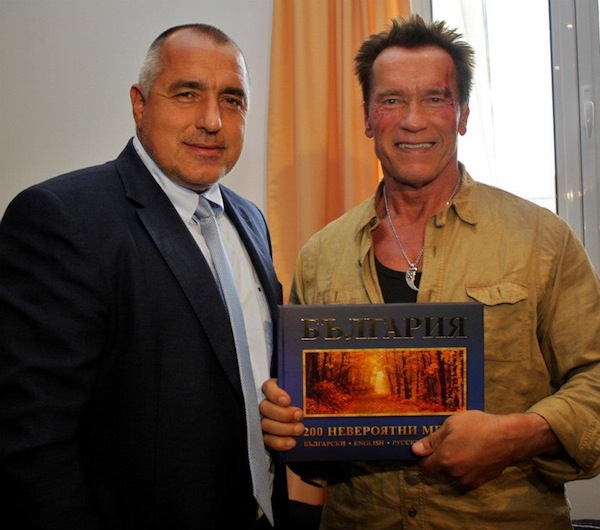
Movie stars Arnold Schwarzenegger, Sylvester Stallone, Chuck Norris, Bruce Willis and Jason Statham are actually in Bulgaria for the shooting of the "The Expendables 2" at the Nu Boyana Film Studios.
Bodyguard services are provided by a Bulgarian security firm connected to the most powerful local organized crime group TIM, according to secret cables sent from the US Embassy in Sofia and published by Wikileaks.
Pictures taken during Schwarzenegger's arrival at the Sofia International Airport, published in Bulgarian media, show a Mercedes SUV, waiting for the actor, with license plate C4401XA, registered to a company owned by the Varna-based TIM and commonly used by the TIM boss Ivo Kamenov. According to unconfirmed reports, the SUV is armored to the 7b level, which is very rare in Bulgaria.
Another picture portrays kick boxer Todor Todorov standing close to Schwarzenegger. Todorov is a competitor of the TIM sports club and a bodyguard, employed by the Sark Group company, founded in 2004 by the former chief of security of TIM boss Marin Mitev.
The security activities of TIM are spread among several firms with the most popular one being TIM EOOD, offering VIP security services in Bulgaria and abroad, according to the official internet page tim.bg.
The Nu Boyana studios, contacted by bivol.bg, have declined giving information about the company providing security for Hollywood stars, shooting in Sofia, and in particular for Schwarzenegger.
TIM - "The up-and-coming star of Bulgarian organized crime"
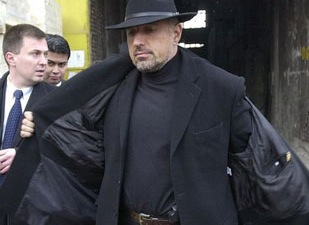
Bulgarian Prime Minister, Boyko Borisov, in an interview for the political TV show “Face to Face” with host, Tsvetanka Rizova, September 4, 2011. (Video here):
TR: There was information, released by WikiLeaks, showing your position on GMO had been quite hypocritical.
BB: Released by whom?
TR: Hmm, I don’t know if you are aware that your ministers went to…
BB: I do not read them.
TR: Well, let me tell you. Your ministers…
BB: I do not read them.
TR: Your ministers went there and have said that due to public pressure we will not plant GMO crops, but otherwise we want them and count on Europe to make us do it.
BB: I think that…
TR: What are our guarantees that you are sincere when it comes to the environment?
BB: (thinking) What minister went there?
TR: Miroslav Naydenov (Agriculture Minister) is cited there.
BB: I asked him; he said he did not go. And he did not discuss any such matter.
...
BB: And about GMO… The way you presented it, it looks like someone had been a hypocrite.
TR: Yes, this is how it looks like, according to WikiLeaks; it was simply hypocritical.
BB: Who is WikiLeaks?
TR: How come, who is WikiLeaks? (BB: Who does it represent; who decides…) The ones who release the cables…no one has denied these cables so far.
BB: Yes, because no one wants to deal with them, because once they start denying them…
TR: Don’t you think that if this was a lie, there would have been some official statement? Everyone keeps quiet; it means they are true.
BB: If they were true, they would have published them all, from A to Z, not selectively, to choose and release depending on when and what is convenient… in connection…I am talking about those on Bulgaria.
TR: We must come to conclusion now.
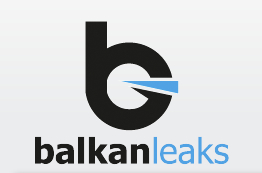 Atanas Tchobanov is the spokesman for balkanleaks.eu and co-editor of Bivol.bg as well as a regular writer on WL Central.
Atanas Tchobanov is the spokesman for balkanleaks.eu and co-editor of Bivol.bg as well as a regular writer on WL Central.
Balkanleaks.eu is a whistleblowing Web site modeled on WikiLeaks, and formed to "promote transparency and fight the nexus of organized crime and political corruption in the Balkan states." The site solicits "confidential documents related to political, criminal or financial topics, by offering a manner of collection that is secure and anonymous." Bivol.bg is a Web site devoted to investigative journalism.
In a climate where only three years ago, the editor in chief of a Bulgarian online news provider was severely beaten following several attacks on journalists the same year, both balkanleaks.eu and Bivol.bg have been instrumental in exposing corruption and the abuse of power by organized crime and politicians. You can read some of Bivol's coverage here at WL Central and also here in Bulgarian and Macedonian.

Bulgarian PM Boyko Borisov refuted yesterday the Wikileaks revelations about his past ties to organized crime, metamphetamines traffic and his dependence from a shady businessman from Lukoil.
"I don't read Wikileaks" - he said before the media in The Hague, Netherlands, on 26th of May, where he opened the 7-th international meeting of Bulgarian media, organized by the Bulgarian news agency BTA.
Asked by journalists about his comment on the cable content, published by the Bulgarian web site Bivol.bg, the local Wikileaks partner, Borisov acknowledged he phoned the US Ambassador James Warlick, who said that the Wikileaks publications are "based on unconfirmed sources and it was futile to comment on them".
"As far as I know, they have not published anything positive about anybody yet. They also cite tabloids publications and comments of various political parties," Borisov said. "I don't read tabloids" - he concluded.
Later the same day, the US Embassy published a statement saying that "It is important to keep in mind that diplomatic cables are often preliminary and incomplete analyses of international affairs, and should not be seen as official representations of U.S. foreign policy"
US Ambassador to Sofia, Jonh Beyrle wrote the said cable on Borissov on May 9, 2006. The report’s confidentiality level is listed as SECRET/NOTFOR (NOT FOR FOREIGNERS), only one level below the highest TOP SECRET level, not available to Wikileaks.
The cable is one of the few from a total of 978 reports sent from Sofia, that have been checked and approved simultaneously by the Embassy’s political, military and security advisors, not just Ambassador Beyrle.
Borissov described himself as "Bulgaria's biggest asset"
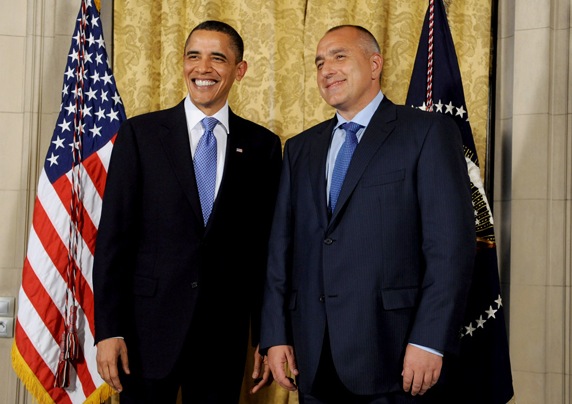
"We must continue to walk a fine line between being used by Borisov's publicity machine and alienating an exceptionally popular and seemingly pro-American politician who may emerge as Bulgaria's next leader. In other words, we should continue to push him in the right direction, but never forget who we're dealing with."
This is the conclusion of a diplomatic report dedicated to now Bulgarian Prime Minister, Boyko Borisov, sent by former US Ambassador to Sofia, Jonh Beyrle on May 9, 2006. The report’s confidentiality level is listed as SECRET/NOT FOR FOREIGNERS, only one level below the highest TOP SECRET – cables classified as TOP SECRET are not available to Wikileaks.
The reasons for classifying the report are coded as 1.5 (b,d), meaning confidential sources have been used in its preparation.
The cable has another characteristic – from a total of 978 reports sent from Sofia, there are just a few that have been checked and approved simultaneously by the Embassy’s political, military and security advisors, not just Ambassador Beyrle.
"The Dirt"
This is how Beyrle titled the section focusing on Boyko Borisov’s criminal past. Incidentally, the paragraph has the "lucky" number 13, while in the brackets, after 13, the level of confidentiality is purposely listed as SECRET/NOFOR, which corresponds to the highest level of classified information for this cable.

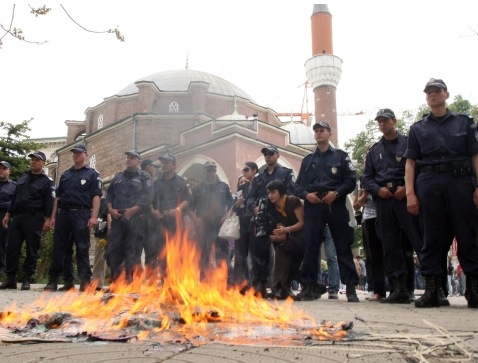
Bulgaria held European elections in June 2009, followed by the national parliament elections in July. The main political players are analysed by the american ambassador in Sofia Nancy McEldowney in two cables sent to Washington DC and reported by the investigative journalism site Bivol, a local partner of Wikileaks. [09SOFIA301] [09SOFIA264]
The cables give a rough picture of a political landscape plagued by corruption, shady businessmen, vote buying and accused criminals running for MP.
Bulgarian media stressed the direct translation of the title "Garbage in, Garbage out", adding that not all of the Bulgarian MPs deserve to be named "garbage", but many of them are looking after their private interests first, through heavy lobbying. "Now, it's up to them to reject this qualification. With a radical change" - popular daily "Troud" wrote in an OpEd.
English language site Novinite stressed the comparison of Ataka (Attack) party and the ethnic Turkish Movement for Rights and Freedoms. They are each other's "best enemies", according to the cable.
"Local analysts say Ataka and MRF need each other to frighten their constituents into voting." the cable says.
Currently, Ataka is the ruling centrist-right GERB's only parliamentary ally.
Two weeks after the publishing of the full, unedited version of a diplomatic cable exposing the total invasion of Bulgarian economics and politics by the organized crime, the topic seems to be closed for Bulgarian media.
Bulgaria is known to have one of the most censored media in the European Union. In the last press freedom index of Reporters without Borders, the country shares the 70th ranking with Benin, Kenya and Greece.
One of the reasons for such low freedom of speech standards is shady media ownership. As the US ambassador reports in the cable, figures connected to organized crime own, directly or indirectly, the country’s mainstream printed and electronic media. This results in censorship and self-censorship on topics about the ties between the Mafia and the politics.
The media reaction, after the cable on organized crime was published, went through the classic way of dealing with such scandalous information: 1. Ignore it 2. Ridicule it 3. Fight it... then return to number 1.
1. Ignore it: The initial publication of the unedited cable on the Bivol independent investigative journalism web site was only reprinted in few independent blogs and web sites, most of them edited from abroad: (Ivo Indzhev, Eurochicago, Kafene). Only one big Bulgarian newspaper printed a link to the publication in a short article. The content of the cable, however, was greatly commented on and cited in online forums.
Analysis of unedited cable: 2011-03-18 Bulgarian Organized Crime Uncensored
2011-03-19 Bulgarian "Criminal Radiation" Leaks from Unedited Wikileaks Cable
Bulgarian translation of both articles here.
UPDATE: The Wikileaks site has now been updated with the uncensored version of the 05SOFIA1207 cable. The full text scores 5226 words compared to the 1406 words in the Guardian redacted version published on December 1 2010. The redactions are shown clearly here (thanks to commenter rhill for pointing it out). The parts that were redacted are green.
At the end of November, 2010, Wikileaks triggered the Cablegate scandal: the release of 251 287 secret American diplomatic cables. Currently, the site has published 5 000 cables or about 2% of the entire database. Eight of them are from the American Embassy in Sofia.
The Wikileaks site has a total of 978 diplomatic cables from the US Embassy in Sofia. There are another 66 cables with the tag Bulgaria.
On December 1, 2010, The Guardian published on its site the diplomatic cable of the American Embassy in Sofia dedicated to organized crime in Bulgaria.
On December 7, 2010, Le Monde published an overview about the influence of Russian mafia in Europe, also citing the cable, signed by then Ambassador to Sofia, James Pardew.
Theme by Danetsoft and Danang Probo Sayekti inspired by Maksimer